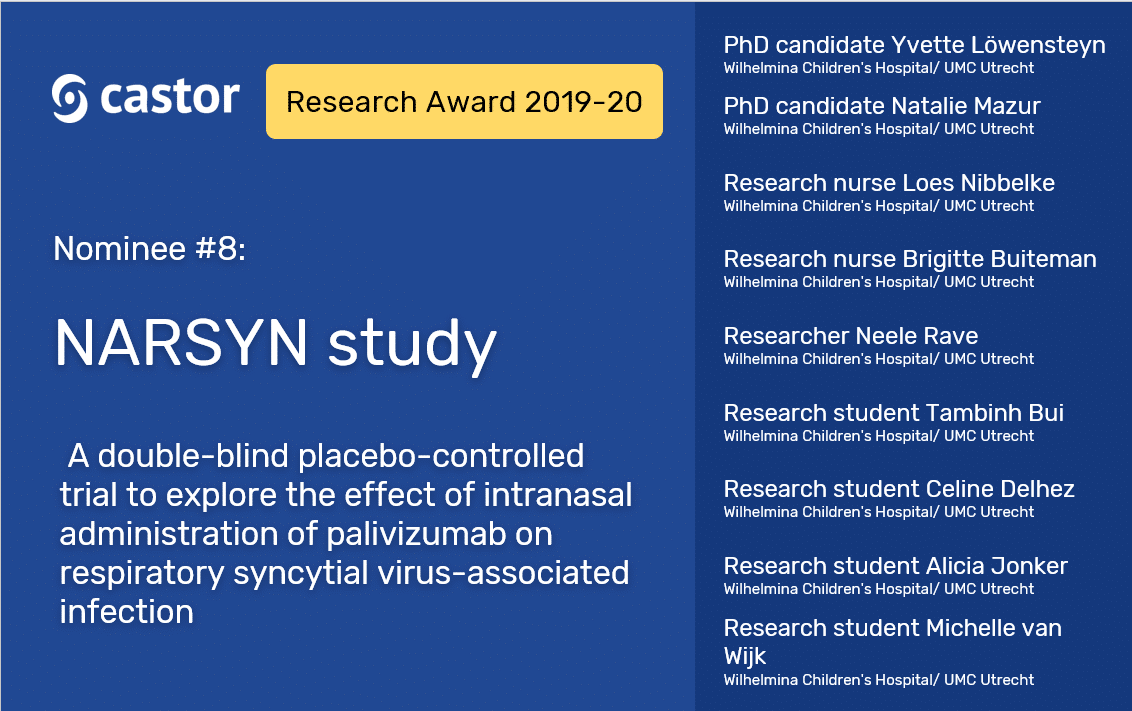Respiratory syncytial virus (RSV) is the secondary cause of death after malaria for children <5 years of age worldwide. Using palivizumab to prevent RSV hospitalization is so costly that it is limited to high-risk groups in developed countries. Local administration of this monoclonal antibody might be more effective, less costly and more patient-friendly. Nominee #8 for the Castor Research Award will use NARSYN study to understand whether palivizumab nasal drops protect infants against RSV infection during their first year of life.
Research Overview
Respiratory syncytial virus (RSV) is the secondary cause of death for infants after malaria worldwide. RSV is estimated to be associated with 33.1 million cases of acute respiratory tract infection in 2015. There is currently no vaccine or treatment for RSV. Palivizumab, a humanized monoclonal antibody, is the only approved preventive intervention. However, it is currently limited to high-risk infants in developed countries due to prohibitive costs. To prevent one RSV hospitalization, the current estimated cost for palivizumab is €100,000. Not only are costs high, but prophylaxis is currently administered via monthly intramuscular injections. Monoclonal antibodies for diseases limited to a certain tissue (in the case of RSV, the respiratory tract) may be more effective, less costly, and have fewer side effects when administered locally instead of systemically.
About the team
- Affiliation: Division of Infectious Diseases, Department of Pediatrics, University Medical Centre Utrecht, Utrecht, Netherlands
- Team members:
- Yvette Löwensteyn and Natalie Mazur coordinate the NARSYN study. Both are Ph.D. candidates in the RSV Research Group of Professor Louis Bont in Wilhelmina Children’s Hospital, Utrecht.
- Loes Nibbelke and Brigitte Buiteman, both research nurses, are involved in recruitment and logistics.
- Neele Rave is a research assistant and is also involved in recruitment and logistics.
- Tambinh Bui, Alicia Jonker, Celine Delhez, and Michelle van Wijk are medical students who work as a student-researchers within the NARSYN study team.
- Tambinh Bui is responsible for study set-up in Castor, study monitoring, and follow-up.
- Alicia Jonker is responsible for the study materials, standard operating procedures, and follow-up.
- Celine Delhez supports the team with legal contracts and follow-up.
- Michelle van Wijk supports the team with all sorts of logistics and is also responsible for follow-up.
Study design and methodology
The NARSYN study is a double-blind placebo-controlled trial in the target population, late preterm infants born 32-35 weeks gestational age who have an older sibling. Parents are asked to administer daily NARSYN or placebo nose drops during the RSV season (October to March). Parents will keep a diary to record whether they administered the study medication daily and whether the child has respiratory symptoms. In case of respiratory symptoms, parents will take a nasopharyngeal swab and send it to the UMC Utrecht.
Research outcome
The main study outcome is total RSV infection. The main secondary study outcome is RSV hospitalization. Other secondary outcomes include medically-attended RSV infection, any hospitalization, any non-hospitalized RSV infection, any respiratory disease, non-tested medically attended respiratory tract infection (RTI), RSV negative RTI admission, non-tested RTI admission, use of respiratory medication, otitis media, and wheeze in the first year of life. We also collect data on incidence and total days of RSV-associated ICU stay, mechanical ventilation, and supplemental oxygen.
How NARSYN study team uses Castor
The team uses Castor EDC to randomize patients, to collect research data including follow-up data, to send weekly surveys until the participants are 1-year-old, and for data monitoring. The research data contains baseline eCRFs, questionnaires, participant diaries, study medication adherence data, data on nasal swabs that have been collected, SAEs and AEs, and weekly surveys.
“The Castor team has been very supportive with any questions we had,” said Yvette Löwensteyn. “They always respond quickly. It is a very user-friendly and affordable (free!) platform, and it provides a clear overview of the data of the study participants. We appreciate the built-in dependency option that we have used a lot for our data validation. We also like the fact that we are able to access the project with multiple investigators. We would recommend Castor to anyone who is looking for an easy-to-use and free platform for data capturing.”
Stay tuned on the Castor EDC blog for more 2019-2020 Castor Research Awards nominations. We wish the nominees good luck and smart science—and encourage all researchers to share their projects for the chance to win €3000!

